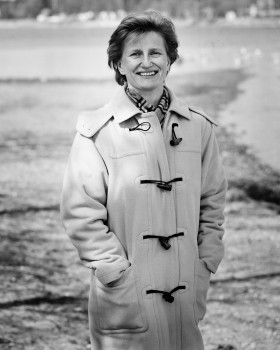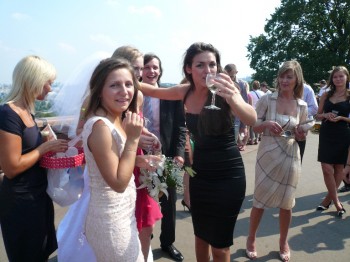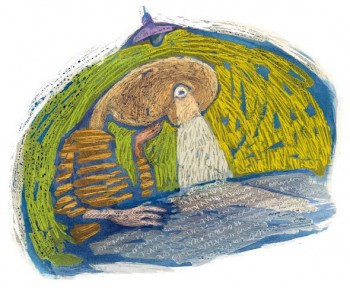Search results for "2010/02/let-us-eat-cake"
The dead speak kindly
1 November 2012 | Fiction, poetry
Memory, winter and everyday are studied in Tua Forsström’s new collection of poems, En kväll i oktober rodde jag ut på sjön (‘One evening in October I rowed out on the lake’, Schildts & Söderströms, 2012). Introduction by Michel Ekman
I fell through the papers laid aside
I came to a place where I was supposed to stay
for four nights but I stayed four years
Someone said: you have caused the council considerable expense
I said: this is my situation
A brave little cat came to my rescue
I could see what I wanted in the dark
at night and no one saw me
It was like a dream but I wasn’t dreaming
I was not afraid and I could pass through chalcedony
I could pass through quartz crystals
I could pass through sad and sick
On the bottom in the mud coins from many lands lay gleaming
We wish for anything between heaven and earth
All that we see and cannot see and lost
I do not recognise myself, and no one sees me More…
Journey to the first palm tree
16 October 2014 | Fiction, Prose
Teemu is a fat, desperate middle-aged man who’s had it with life – he drives his old Lada to Spain, where he intends to commit suicide by letting himself be trampled to death by bulls in the Pamplona bullrun. (However, there is a chance of this tragedy being cancelled, thanks to a tenacious hitch-hiker, female.) An extract from the novel Särkyvää (‘Fragile’, Tammi, 2014)
When I was seventeen, I yearned to leave behind the small town where I grew up. I heard the owl hooting in the forest: go to Europe.
I heard the dirt-track gravel crunching beneath my shoes: run, lad, run.
The birch in the yard rustled and whispered: if you spend one more summer hanging around the garden of your childhood, you’ll stay here forever.
A frog in the ditch gave a stern croak: look at your father; if you don’t escape you’ll end up an old codger just like him.
Even the smoke twirling up from the sauna chimney spoke to me in billows: I’ll show you the right direction, head south, and don’t stop until you see the first camel. More…
Noah’s progeny
30 October 2009 | Fiction, Prose
Extracts from the novel Puupää (‘Blockhead’, Teos, 2009)
In these ‘shavings’ hewn from the block in constructing the storyline of his new novel, Juha Hurme offers us four unique glimpses into the Finnish psyche
The rune singer of Nokia
Three years ago I purchased a used mobile phone when its predecessor took an overdose of sea water and went mute on a rowing trip in a broken-down loaner of a fibreglass boat in a gale-force nor’wester. This three-year-old phone has been a thoroughly satisfactory implement and indispensable contact link. The power button got stuck a year ago, but the gadget is still fully operational with the aid of a match stick or something similar. It is my belief and hope that it will continue to fulfil the role of telephone for seven more years, because I prefer not to own, let alone purchase, anything that withstands fewer than ten years of use. More…
The guest book
30 June 1997 | Archives online, Fiction, Prose
An extract rom the novel Kenen kuvasta kerrot (‘Whose picture are you talking about’, Otava, 1996). Introduction by Pia Ingström
Late at night before going to bed An Lee had turned off all the lights, opened the large bedroom window, breathed the cool air. She had done this often. It made it easier to fall asleep. It was enough to look outside for a moment and to breathe in slowly, and at the same time the bedroom air freshened and changed for the night.
Then she had closed and locked the window, drawn the curtains, and switched on the dim wall light. It might be nice to decorate the space between the double windowpanes with wooden animals, she had thought, not for the first time. They had had some at home, her mother had been a collector of such things. Almost all of them pink and lemon yellow, a whole zoo between the windows, only the panther had been pitch-black, and on one of the elephants the pretty grey color had been scratched and splotchy on one side. More…
The last lap
30 June 2001 | Archives online, Fiction, Prose
A short story from Ilmatasku (‘Air pocket’, Otava, 2000). Introduction by Soila Lehtonen
Father arrived by taxi with his black suitcases.
He stood in the hallway, casting a glance over father’s shoes, his trouser-legs. Under his arm was a folded newspaper; it fell to the ground when father bent to undo his shoelaces.
The newspaper was written in strange letters. It felt as if the saliva would not leave his mouth however hard he swallowed. Mother jumped back and forth; mother’s mouth chattered. He scratched the wall with his nail; it was scored with pencil lines recording how much he had grown.
When father straightened up, he filled the whole room. More…
Intelligent living

Minna Lindgren. Photo: Ville Palonen.
In Ehtoolehdon tuho [‘The decline of Twilight Grove’, Teos, 2015), the final novel in a trilogy about life in an assisted living home, employing human staff has become too expensive and the old folk are part of a pilot project in which they are cared for by electronic devices, monitors, cameras, ‘smartwalls’ and cleaning robots: ‘there was intelligence everywhere, masses of it, just a hiccup and something terribly intelligent would happen.’
The aged lady residents don’t like their new life, but they’re resilient; they’re not about to let the new technology defeat them…
Minna Lindgren’s mordantly satirical, often hilariously funny writing has earned her a wide readership. Translations of the trilogy are soon to appear in English, German and French.
![]()
An excerpt from Ehtoolehdon tuho [‘The decline of Twilight Grove’, Teos, 2015). Review by Soila Lehtonen
‘You’re 97 today! Your wakeup call service today congratulates!’
As if she wouldn’t have remembered. Ninety-seven was almost a hundred. She and Irma had decided that they would refuse to turn one hundred. It would only make trouble. One lady, in the bottom apartment of the A staircase, had received an invitation to the health centre on her birthday. Apparently all five-year-olds were called in for monitoring of their motor and psychological development, and when this lady turned 105, the computer system thought she was a toddler. The computer didn’t recognise numbers over one hundred. Siiri thought the lady should have kept the appointment; she would have done, for the tests were fun. You had to draw a triangle and walk along a straight line. Not that easy for someone of 105. But the lady didn’t go, she just made a terrible fuss about it and complained to everyone, until she died before her complaints reached the right official. More…
The train
31 March 1995 | Archives online, Fiction, Prose
Extracts from the novel Koe (‘The experiment’; WSOY, 1994). Interview by Tuva Korrström
In the morning a wild rose tapped beseechingly at the window, the wind sighed in the shaft of the chimney, the entire house creaked, pregnant with so great a longing that they had to awaken.
And as soon as they began to speak to each other, the house settled.
‘I should like to see the train,’ Sari said.
‘Why?’
‘Because that is the reason why I am here.’
‘I didn’t plan it like that,’ Kari said. More…
Brief lives
30 September 1989 | Archives online, Fiction, Prose
Rosa Liksom’s characters live in the tiny villages of empty Lapland, speaking a dialect that rings oddly in the ears of the southern Finnish majority; or they may inhabit anonymous towns, but there, too, life is full of the anguish of existence. Liksom, whose black comedy can be compared with that of the Danish writer Vita Andersen, is able to cram into her short texts complete life histories, bizarre, comic or tragic. Her first volume of short stories, Yhden yön pysäkki (‘One night stand’) appeared in 1985; the following short stories are from Tyhjän tien paratiisit (‘Paradises of the open road’, 1989)
We got hitched up the 14th of November and by the end of the month it was all over. As far as I’m concerned call it a marriage exactly two weeks too long. We hadn’t set eyes on each other till the Pampam that’s the place me and the girls go after work for a drink and I was sitting there having one with them when who comes through the door but this bloke and it hits me. That bloke’s for me. In the end I went over to his table and said up yours stud. We went over to my place to bunk down and after that I couldn’t get the sod out. The bloody shitbag got his claws into me and hung on just on the strength of that one night. He glued himself to my bed. Lay there flat out when I set off to work and shit he was still there when I came back only arse up this time. More…
The Schoolmaster’s bicycle trip
30 June 2005 | Archives online, Fiction, Prose
A short story from the collection Heta Rahko korkeassa iässä (‘Heta Rahko at a great age’, Otava, 1947). Introduction by Vesa Karonen
He was an old teacher, retired, mostly known as ‘the Schoolmaster’ in this small town. It was common knowledge that he’d always been a keen gymnast and sportsman, and after retirement he began pursuing his favourite pastimes in earnest. Evidently he revelled in moving about, like a baby on the crawl, or a feisty youth. He was a man with no personal ties, with no one to patronise or distract him.
‘You grow no wiser, even with age,’ the small-town folk kept sighing. In response to one of these groans, Porki the factory owner said what they thought was almost blasphemy:
‘When did old age ever produce any wisdom? It’s always demolished any little there was….’
And meanwhile, covertly envious, he watched the youthful-looking Schoolmaster striding along his path, lean, sinewy, stern-faced, his tuft of beard only reluctantly thinning and greying. Well, there was a person who’d realised life was motion – and believed it! But Porki and the other bigwigs in the town grew bloated and obese, huffed and puffed, and yawned. More…
Keeping up with the Joneskis
17 April 2009 | Extracts, Non-fiction

Toasting the bride: cheerful wedding parties drive up to the Sparrow Hills in Moscow in summer
Moscow-based journalist Anna-Lena Laurén finds the new Russia a promised land of materialism – a place where appearances are everything, and how you pay for maintaining them is a matter of strictly secondary interest
‘I want to go to the nightclub by boat! Come on, let’s hire one,’ Ilya says, heading towards the shore where a boat for at least twenty people is moored. There are six of us.
After two minutes of negotiation, he takes up his position alongside the gangway. He welcomes us onboard with a chivalrous gesture. We step onto the boat and are gently taken off down the Moyka canal in the white night of St Petersburg in June. The sky is pale pink and dark blue-lilac, the air damp and cold, but the captain hands out rugs to keep us warm. The ornamented bridges and pastel-coloured façades of St Petersburg glide past in a faint glow, it’s just light enough to make out the colours, powdery pink, vanilla yellow, pale blue. More…
Speaking about the heart
30 June 1991 | Archives online, Articles
New Finnish poetry, translated and introduced by Herbert Lomas
The ‘modernist’ revolution in Finnish poetry is now 40 years old, and the art must be ripe for changes.
Of course, the modernism of post-war Finnish poetry was not – except in Haavikko and to some extent in Saarikoski – extremely modernist. The poets were more interested in their content than their experiments. They were perhaps closer to ancient Chinese poets and early Pound than to Eliot in their elided brief juxtapositions and meditations on nature, society and moment-to-moment transience. The poets picked up a few liberties that unshackled them from metrical and rhyming formalities uncongenial to Finnish stress, syntax and phonemics; and they took off to speak about the heart. That is the strength of this poetry, and its originality, since all originality consists in being oneself – which includes one’s national self, and ultimately other people’s selves. And every generation still has to make a new start, admittedly in new circumstances, with the experience of its forefathers from birth to death. More…
The monster reveal’d
31 March 1997 | Archives online, Fiction, Prose
Extracts from the novel Frankensteinin muistikirja (‘Frankenstein’s notebook’, Kirjayhtymä, 1996). Ern(e)st Hemingway and Gertrud(e) Stein – the narrator in these extracts – meet the famous creature in Paris. According to Juha K. Tapio in this, his first novel, Mary Shelley’s monster has been leading an interesting life during the past few centuries
My first impression was that there wasn’t anything particularly monstrous about him. I have already said that his age was hard to determine, but there was something about him that tempted one to apply the word ‘elderly’ to him. He was up in years, no doubt about that, but in a rather special, indefinable way – which made it hard to infer, at least from his outward appearance, what stage he had reached in terms of normal human life. It had to do with something outside of time. He was tall and a little more raw-boned than the average person, and this made one wonder, looking at him, what kind of body his very fashionable clothing concealed his suit and tie conformed to the latest style. This was certainly not the misshapen and monstrous creature I vividly remembered from Mary Shelley’s description.
It was obvious that the past decades had brought about an inevitable evolution. More…
Can’t say it’s not spring
18 April 2013 | Fiction, Prose
Short prose from Mahdottomuuksien rajoissa. Matkakirja (‘In the realm of impossibility. A travel book’, Teos, 2013). Texts by Katri Tapola, illustrations by Virpi Talvitie. Interview by Anna-Leena Ekroos
The first try

A reader doesn’t have to understand anything on the first try. You can always put a book aside and see if the second read will help. If the second, third, fourth, or even fifth read doesn’t help, that’s still all right. What is this constant compulsion to understand everything? There’s nothing wrong with not understanding – on the contrary, it is precisely the state of baffled befuddlement that hides the hope of light within it. I can’t understand any of this! I’m having fun! the reader happily exclaims, and goes on with his life, eyes overflowing with light. More…
Letters from Klara
31 March 1992 | Archives online, Fiction, Prose
A short story from Brev från Klara (‘Letters from Klara’, Söderström & Co, 1991)
Dear Matilda,
you are hurt because I forgot your ancient birthday: that is unreasonable of you. To put it bluntly, you have expected my particular devotion all these years merely because I am three years younger. But let me now at last tell you that the passage of the years An Sich is no feather in one’s hat.
You pray for Higher Guidance – excellent. But until you receive it, it might perhaps be as well to discuss certain bad habits which are, as a matter of fact, not foreign to me, either. More…


